Select Language
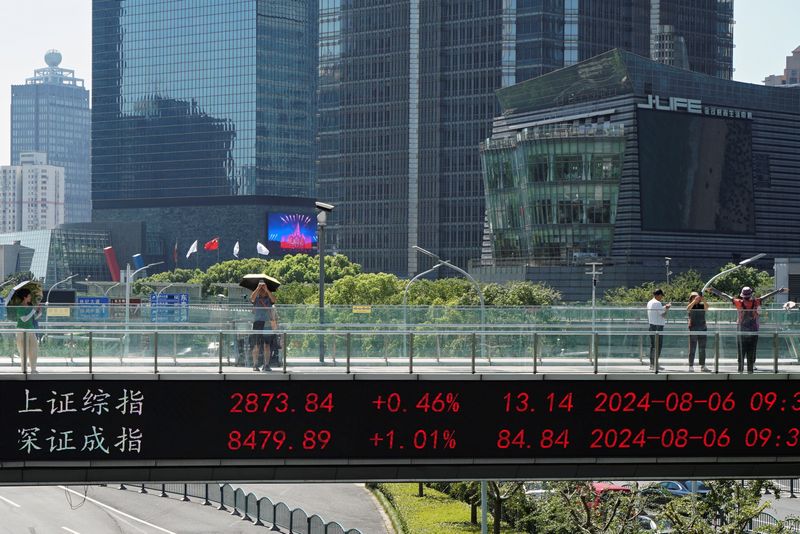
By Stella Qiu and Chibuike Oguh
SYDNEY/NEW YORK (Reuters) -Global share markets were under pressure on Friday as investors counted down to a U.S. jobs report later in the day that could exacerbate or ease the sell-off in the global bond market, while the dollar stood near two-year highs.
Both Nasdaq futures and S&P 500 futures were down 0.3%. Wall Street was closed overnight to mark the funeral of former U.S. President Jimmy Carter.
Pan-European STOXX 50 futures and UK FTSE futures were flat.
The closely watched U.S. nonfarm payrolls report is due at 0830 U.S. Eastern time (1330 GMT). Median forecasts are for a rise of 160,000 in jobs in December with unemployment holding at 4.2%.
Anything stronger could see 10-year Treasury yields spike to 13-month peaks and lift the U.S. dollar in the process.
Analysts at ING believe a print below 150,000 jobs would be needed to stop Treasury yields from rising further.
"Payrolls, as always, are a pivotal report. But we need to deviate materially from consensus to have an effect this time around," said Padhraic Garvey, regional head of research, Americas, at ING.
"Given the move already in Treasuries, there is some talk that Friday's numbers will need to be strong to continue this momentum, and in that sense there is some vulnerability for a lower yield reaction to a consensus outcome."
In Asia, Japan's Nikkei fell 0.9%, taking its weekly loss to 1.6%. MSCI's broadest index of Asia-Pacific shares outside Japan was off 0.5% and headed for a weekly decline of 1.2%.
China's blue-chips slipped 0.4% and Hong Kong's Hang Seng dropped 0.5%.
Chinese government bond yields climbed after the central bank said it has decided to suspend treasury bond purchases temporarily due to short supply of the bonds.
Overnight, Philadelphia Fed President Patrick Harker said he expects the U.S. central bank to cut interest rates, but added that an imminent move down isn't needed. Kansas City Fed President Jeff Schmid signaled a reluctance to cut interest rates.
Markets have already scaled back expectations to around 43 basis points of U.S. rate cuts for 2025, while concerns about President-elect Donald Trump's potentially inflationary agenda have helped drive up longer-term yields.
The benchmark 10-year U.S. Treasury yield climbed 1.5 basis points to at 4.6957%, just below an eight-month peak of 4.73% hit on Wednesday. The big chart level is 4.739% and if that breaks, bears would be targeting the psychologically important level of 5%, which has not been seen since 2007.
The climb in Treasury yields - up about 9 bps this week - has bolstered the dollar index to 109.30, gaining for a sixth straight week.
Worries about Britain's economy have kept the pound under pressure and hit gilts especially hard, driving yields to 16-1/2-year highs, although they have retreated somewhat.
The pound slipped 0.2% on Friday to $1.2278, having touched its lowest since November 2023 overnight. It is down 1.1% this week. [FRX/]
Oil prices rose on Friday. U.S. West Texas Intermediate crude futures rose 0.5% to $74.32 and were set for a weekly gain of 0.5%.
Gold prices rose 1.3% in the week to $2,674.44 an ounce, near its highest level since December.

UNITED NATIONS/NEW DELHI (Reuters) - Global economic growth is projected to remain at 2.8% in 2025, unchanged from 2024, held back by the top two economies, the U.S. and China, according to a United Nations report released on Thursday.
The World Economic Situation and Prospects report said that "positive but somewhat slower growth forecasts for China and the United States" will be complemented by modest recoveries in the European Union, Japan, and Britain and robust performance in some large developing economies, notably India and Indonesia.
"Despite continued expansion, the global economy is projected to grow at a slower pace than the 2010–2019 (pre-pandemic) average of 3.2%," according to the report by the U.N. Department of Economic and Social Affairs.
"This subdued performance reflects ongoing structural challenges such as weak investment, slow productivity growth, high debt levels, and demographic pressures," it said.
The report said U.S. growth was expected to moderate from 2.8% last year to 1.9% in 2025 as the labour market softens and consumer spending slows.
It said growth in China was estimated at 4.9% for 2024 and projected to be 4.8% this year with public sector investments and a strong export performance partly offset by subdued consumption growth and lingering property sector weakness.
Europe was expected to recover modestly with growth increasing from 0.9% in 2024 to 1.3% in 2025, "supported by easing inflation and resilient labour markets," the report said.
South Asia is expected to remain the world’s fastest-growing region, with regional GDP projected to expand by 5.7% in 2025 and 6% in 2026, supported by a strong performance by India and economic recoveries in Bhutan, Nepal, Pakistan and Sri Lanka, the report said.
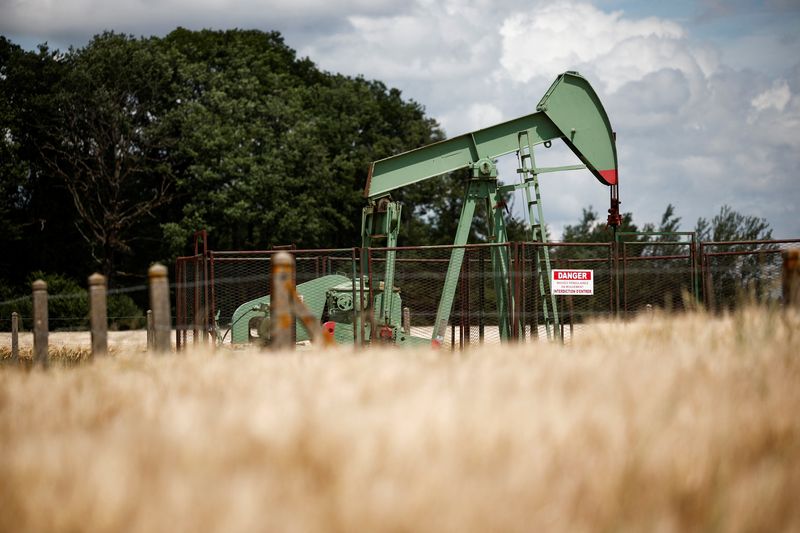
(Reuters) - Oil prices rose in early Asian trade and were on track for a third straight week of gains with icy conditions in parts of the United States and Europe driving up fuel demand for heating.
Brent crude futures climbed 24 cents, or 0.3%, to $77.16 a barrel at 0138 GMT. U.S. West Texas Intermediate crude futures gained 26 cents, or 0.4%, to $74.18.
Over the three weeks ending Jan. 10, Brent has advanced 5.9% while WTI has jumped 6.9%.
Analysts at JPMorgan attributed the gains to growing concern over supply disruptions due to tightening sanctions, amid low oil stockpiles, freezing temperatures in many parts of the U.S. and Europe and improving sentiment regarding China's stimulus measures.
The U.S. weather bureau expects central and eastern parts of the country to experience below-average temperatures. Many regions in Europe have also been hit by extreme cold and will likely continue to experience a colder-than-usual start to the year, which JPMorgan analysts expect to boost demand.
"We anticipate a significant year-over-year increase in global oil demand of 1.6 million barrels a day in the first quarter of 2025, primarily boosted by ... demand for heating oil, kerosene, and LPG," JPMorgan said in a note on Friday.
Meanwhile, the premium of the front-month Brent contract over the six-month contract reached its widest since August this week, potentially indicating supply tightness at a time of rising demand.
Oil prices have rallied despite the U.S. dollar strengthening for six straight weeks. A stronger dollar typically weighs on prices, as it makes purchases of crude expensive outside the United States.
Supplies could be further hit as U.S. President Joe Biden is expected to announce new sanctions targeting Russia's economy this week in a bid to bolster Ukraine's war effort against Moscow before President-elect Donald Trump takes office on Jan. 20. A key target of sanctions so far has been Russia's oil industry.
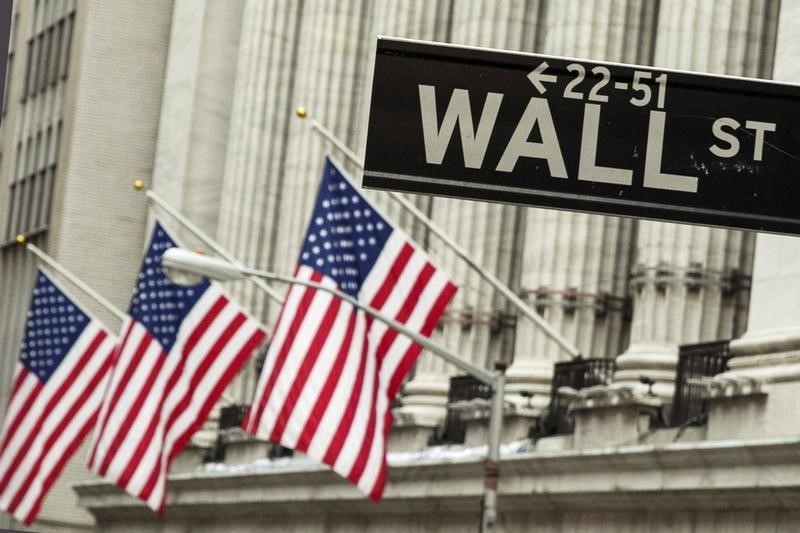
Investing.com-- U.S. stock index futures fell on Thursday evening amid persistent concerns over a slower pace of interest rate cuts in 2025, with upcoming nonfarm payrolls data set to provide more cues on the economy.
The fourth-quarter earnings season is also set to begin in earnest next week, with a slew of major banks on tap.
Trading volumes were thin on account of a market holiday on Thursday to honor the death of former President Jimmy Carter.
Wall Street indexes were nursing a choppy start to 2025, as hawkish signals from the Federal Reserve and uncertainty over President-elect Donald Trump’s policies weighed on risk appetite.
S&P 500 Futures fell 0.3% to 5,942.50 points, while Nasdaq 100 Futures fell 0.3% to 21,287.75 points by 18:11 ET (23:11 GMT). Dow Jones Futures fell 0.2% to 42,809.0 points.
Nonfarm payrolls awaited for more rate cues
Focus was now squarely on nonfarm payrolls for December, due on Friday, for more cues on the labor market and the path of interest rates.
Strength in the labor market is expected to give the Fed even more headroom to cut interest rates at a slower pace. Fears of a labor market slowdown were one of the main motivations for the Fed cutting rates by 1% in 2024.
But the central bank slashed its outlook for rate cuts in 2025, citing concerns over sticky inflation. The minutes of the Fed’s December meeting, released on Wednesday, also showed policymakers were concerned over the inflationary impact of protectionist policies under Trump.

LONDON (Reuters) - The most destructive wildfires ever for Los Angeles may cause billions of dollars in insured losses, ratings agencies said on Thursday, though many homes are likely uninsured.
The wildfires burning in the Pacific Palisades, Eaton (NYSE:ETN), Hurst and other Los Angeles neighbourhoods may lead to insured losses of more than $8 billion, analysts at Morningstar DBRS said in a note. This surpasses the 2018 Woolsey fire in California, which caused more than $6 billion in losses, Morningstar said.
Jasper Cooper, senior credit officer for Moody's (NYSE:MCO) Ratings, expected insured losses to amount to billions of dollars given the area's high values of homes and businesses.
Homeowners have found it tough to buy insurance in catastrophe-prone states as several firms have pulled out of the market.
"These events will continue to have widespread, negative impacts for the state’s broader insurance market," said Denise Rappmund, senior analyst at Moody's.
"Increased recovery costs will likely drive up premiums and may reduce property insurance availability.”
Morningstar DBRS also said a larger than usual portion of the losses could be uninsured or covered under the California FAIR plan, designed to help homeowners where standard insurance is not available.
JPMorgan on Thursday estimated insured losses at $20 billion, Thomson Reuters (NYSE:TRI) publication The Insurer reported, double its estimates of a day earlier due to an escalation of the damage.

By Hyunjoo Jin and Joyce Lee
SEOUL (Reuters) -South Korea's Hyundai Motor (OTC:HYMTF) Group said on Thursday it planned to boost domestic investment by 19% to a record high of 24.3 trillion won ($16.65 billion) this year to secure future growth even as it grapples with economic and political uncertainties.
Hyundai Motor Group, including Hyundai Motor and Kia Corp, ranks third in global vehicle sales behind Toyota Motor (NYSE:TM) and Volkswagen (ETR:VOWG_p).
The planned investment by Hyundai Motor Group includes 11.5 trillion won in research and development for next-generation products, electrification, software-defined vehicles, hydrogen-fuelled products and other technology.
It will also spend 12 trillion won on ordinary investments such as adjusting production lines to make electric vehicles and new models and about 800 billion won on strategic investments such as for autonomous driving, the statement said.
"Hyundai Motor Group is making the largest investment ever in South Korea this year because it believes that continuous and stable investments are essential to overcome the crisis and secure future growth engines in the face of growing uncertainties," the group said, without directly describing the crisis it faced.
Hyundai Motor Group Executive Chair Euisun Chung last week referred to a recession and global conflicts as external risks for the company.
Shares in Hyundai Motor and Kia were up 2.3% and 3.8% respectively in early trade after the news, while the broader market was up 0.1%.
Hyundai and Kia said last week they aimed to grow their combined global sales by 2% to 7.39 million vehicles in 2025, after reporting a dip in 2024 sales and missing their targets.
South Korea's consumer sentiment dropped the most since the 2020 pandemic in December, hit by political uncertainty following President Yoon Suk Yeol's declaration of martial law and his impeachment.
In the United States, President-elect Donald Trump has threatened to impose universal 10% tariffs on imported goods.
Hyundai Motor started production at a new factory in the U.S. state of Georgia last year to make its vehicles eligible for the Biden administration's tax credits, which Trump threatened to scrap.
($1 = 1,459.6900 won)
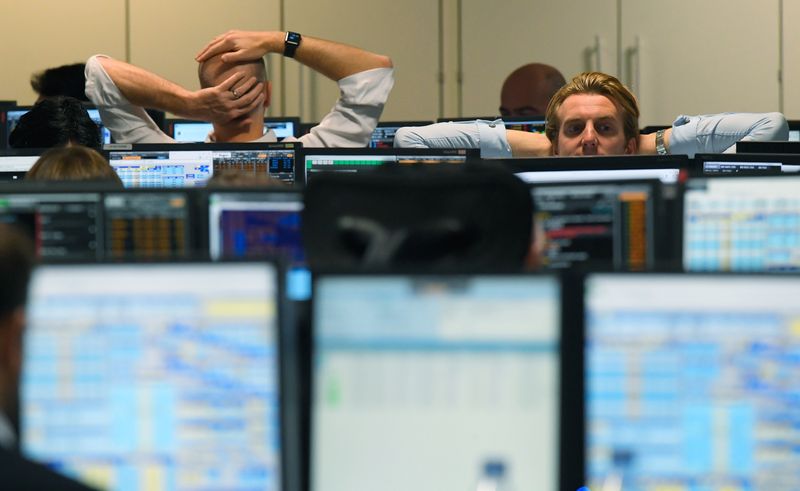
A look at the day ahead in European and global markets from Kevin Buckland
The British bond market has become the focus of global investor attention, for some unenviable reasons.
A 20-basis point spike in benchmark gilts this week to the highest since 2008 is being linked by analysts to a welling crisis of confidence in Britain's fiscal outlook, despite no obvious catalyst for the current wave of selling.
Some are mulling the potential for a rout akin to the one that followed former premier Liz Truss' disastrous mini budget of September 2022.
To be sure though, while the market views gilts as the centre of the bond storm, there are plenty more reasons to be a seller.
The euro zone is bracing for elevated bond supply amid an acceleration in inflation, which helped German bund yields pop to a five-month high on Wednesday.
And of bigger global consequence, the uncertain impact of incoming U.S. President Donald Trump's proposed tariffs and immigration curbs on inflation have both investors and Federal Reserve officials concerned.
The economic data stateside is already flashing warning signs about the stickiness of price pressures, spurring traders to pare bets for Fed easing this year to just 41 basis points, shy of the 50 basis points Fed officials mooted just last month.
Yields on benchmark Treasuries pushed to the highest since April at 4.73% before the notes found buyers.
Caution is likely to win out today in Europe, heading into a market holiday in the United States that will shutter Wall Street and shorten Treasuries trading.
There is also trade and output data from Germany on tap, along with euro-region retail sales figures.
A parade of potentially revelatory central bank speak is in the pipeline as well, with Bank of England Deputy Governor Sarah Breeden giving a speech on the outlook for inflation and monetary policy at the University of Edinburgh business school.
Fed Governor Michelle Bowman, Boston Fed President Susan Collins, Kansas City Fed President Jeffrey Schmid, Philly Fed President Patrick Harker and Richmond Fed President Thomas Barkin also take the podium at various venues.
That's ahead of the big macro event of the week, which looms on Friday in the form of the monthly U.S. non-farm payrolls report.
Key developments that could influence markets on Thursday: * Germany industrial production, trade data (both November) * Euro zone retail sales (November) * BoE Deputy Governor Breeden speaks * Fed officials Bowman, Collins, Schmid, Harker and Barkinspeak * U.S. stock market holiday
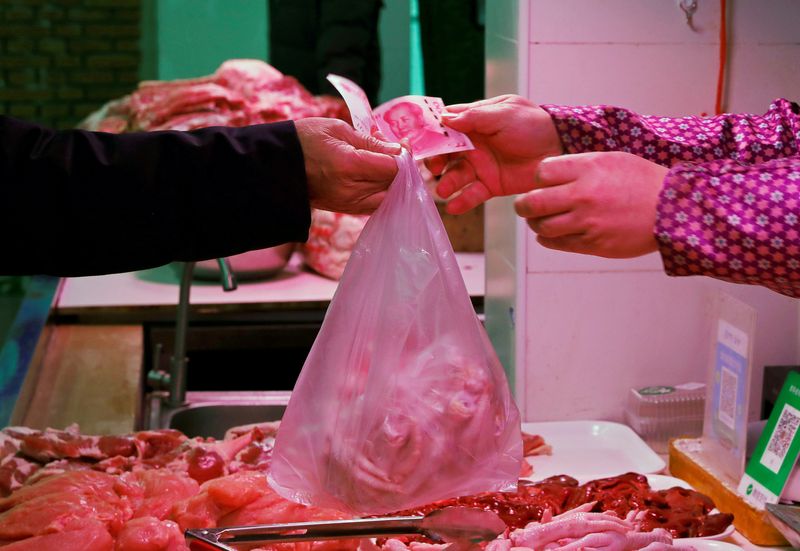
BEIJING (Reuters) -China's consumer prices barely rose in 2024 while factory-gate prices extended into a second straight year of declines, official data showed on Thursday, weighed by persistently weak domestic demand.
A combination of job insecurity, a prolonged housing downturn, debt and tariff threats from the incoming administration of U.S. President-elect Donald Trump has hit demand, even as Beijing ramps up stimulus.
The full-year consumer price index (CPI) rose 0.2%, data from the National Bureau of Statistics showed, in line with the previous year's pace and well below the official target of around 3% for last year, suggesting inflation missed annual targets for the 13th straight year.
In December, the CPI crept up 0.1% year-on-year, slowing from November's 0.2% increase and the weakest pace since April. That was in line with forecasts in a Reuters poll of economists.
However, core inflation, which excludes volatile food and fuel prices, nudged up slightly to 0.4% last month from 0.3% in November, the highest in five months.
Upstream, the producer price index fell 2.3% year-on-year in December, slower than the 2.5% fall in November and an expected 2.4% decline. Factory-gate prices have remained deflationary for 27 straight months.
The pickup in core consumer prices and the slower pace of factory deflation suggested "policy stimulus is providing some support to demand and prices," said Julian Evans-Pritchard, Head of China Economics.
"But with the prop from stimulus likely to be short-lived, we think underlying inflation will drop back again later this year."
In addition to an electric vehicle price war that is entering its third year, discounting is now broadening across the retail sector to include bubble tea shops and other discretionary items.
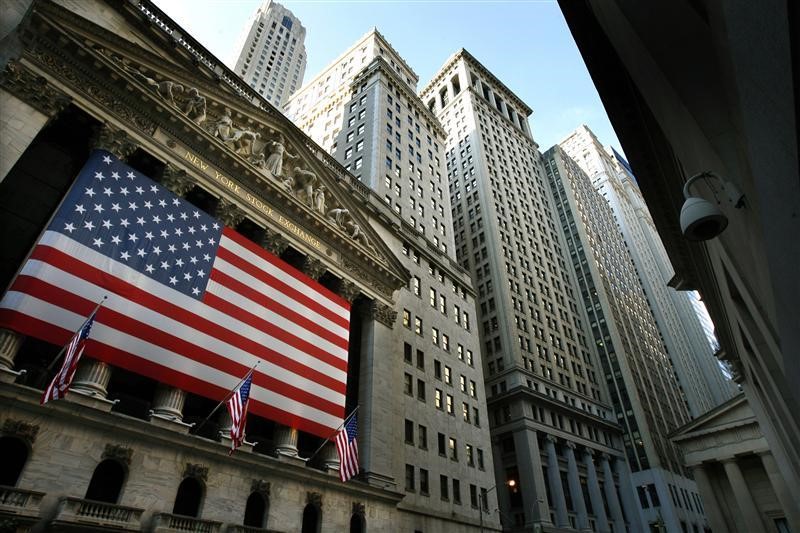
Investing.com-- U.S. stock index futures crept lower on Wednesday evening as investors grappled with the prospect of slower interest rate cuts in 2025 while also speculating over increased trade tariffs under President-elect Donald Trump.
Futures fell after a muted session on Wall Street, as the minutes of the Fed’s December meeting struck a hawkish chord, while also raising some concerns over the impact of Trump's planned tariffs.
CNN reported on Wednesday that Trump was considering declaring a national economic emergency to provide legal justification for a series of universal trade tariffs, as well as duties on China.
S&P 500 Futures fell 0.1% to 5,955.75 points, while Nasdaq 100 Futures fell 0.1% to 21,338.50 points by 18:16 ET (23:16 GMT). Dow Jones Futures steadied at 42,878.0 points.
U.S. markets will be closed on Thursday for a national day of mourning to honor the death of former President Jimmy Carter.
Fed minutes reiterate hawkish outlook, Trump tariff concerns
The minutes of the Fed’s December meeting showed policymakers were increasingly leaning towards a slower pace of interest rate cuts this year, amid persistent concerns over stalling disinflation.
The minutes reiterated the central bank’s hawkish stance, after it effectively halved the number of rate cuts projected for 2025 to two from four.
The central bank cut interest rates by a total of 1% in 2024, but is now expected to cut rates only marginally in 2025, amid signs of sticky inflation and a robust labor market.
Wednesday's minutes also showed some Fed officials were concerned that protectionist policies under Trump will keep inflation underpinned, while also stymieing economic growth. Officials warned that the inflation fight could take longer than expected due to "the effects of potential changes in trade and immigration policy."
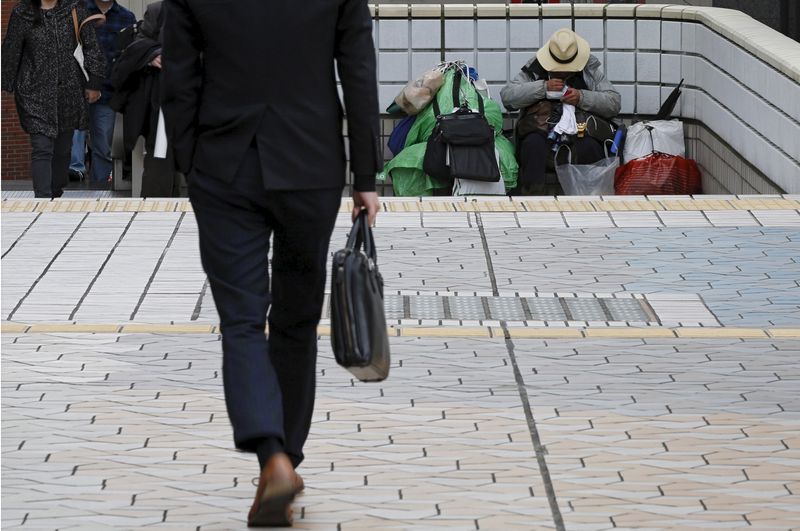
TOKYO (Reuters) - Japan's inflation-adjusted real wages fell for the fourth straight month in November weighed down by higher prices even as base pay grew at the fastest pace in more than three decades, government data showed on Thursday.
The Bank of Japan considers various risks in deciding the timing for raising interest rates and the central bank has repeatedly said sustained, broad-based wage hikes are a prerequisite for pushing up borrowing costs.
Inflation-adjusted real wages, a barometer of consumer purchasing power, slipped 0.3% in November from a year earlier, falling for the fourth straight month, data from the labour ministry showed. It revised October's unchanged reading to a 0.4% decline.
The consumer inflation rate that the government uses to calculate real wages and includes fresh food prices but not rent or equivalent, rose 3.4% from a year earlier, accelerating from a 2.6% growth in October, reflecting higher inflationary pressure.
Base salary, or regular pay, rose 2.7% in November, marking the fastest increase since 1992, the data showed, after major companies agreed to higher pay at the spring wage negotiations.
Overtime pay, a barometer of business strength, grew 1.6% for the month from a revised 0.7% gain in October. Special payments, mainly volatile one-off bonuses, climbed 7.9% in November, after a revised 2.2% fall in October.
Total (EPA:TTEF) cash earnings, or nominal pay, grew 3.0% to 305,832 yen ($1,935.03) for the month, the data showed.
Large Japanese firms are likely to raise wages by about 5% in 2025, the same as last year, the chair of a major business lobby said on Tuesday while pledging efforts to spread the wage growth momentum to smaller firms.
The government of Prime Minister Shigeru Ishiba has put pay rises at the top of its public policy agenda with Ishiba promising to push for wage growth at this year's spring negotiations.
At last year's talks, Japanese firms delivered their biggest pay hike in 33 years.
($1 = 158.0500 yen)

